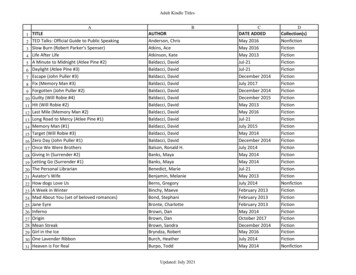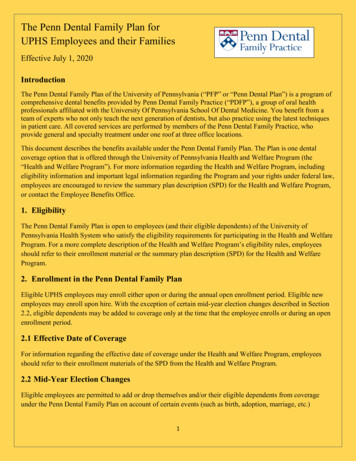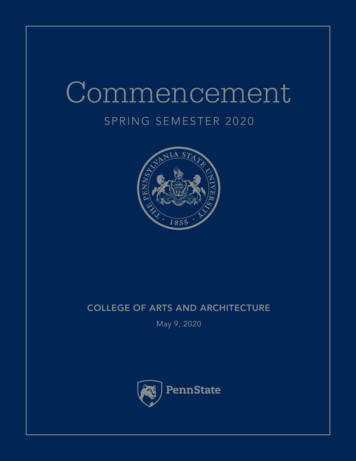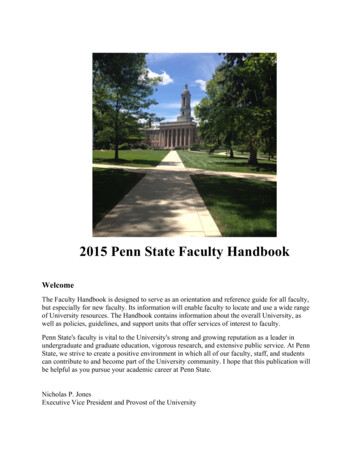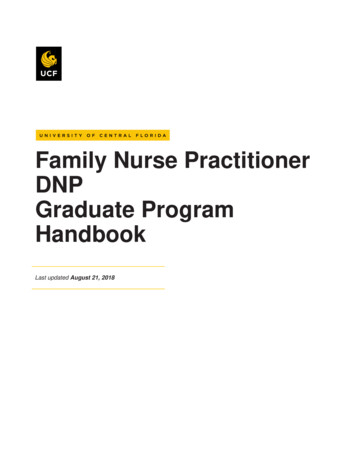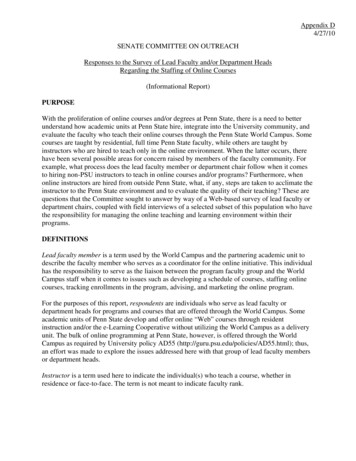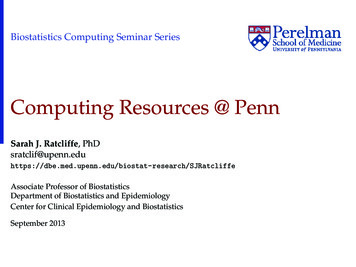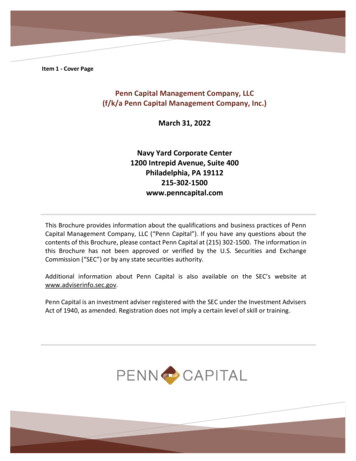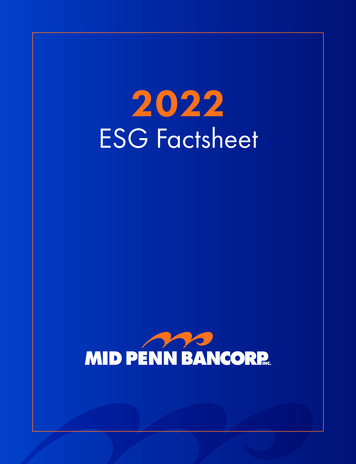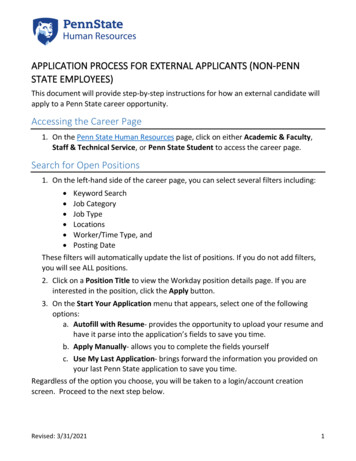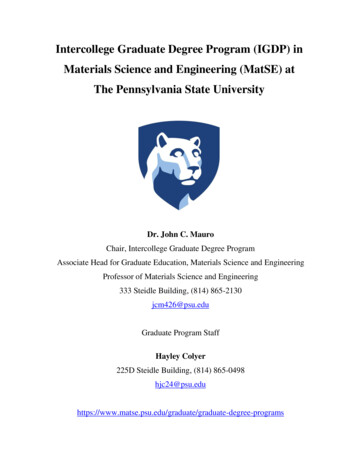
Transcription
Intercollege Graduate Degree Program (IGDP) inMaterials Science and Engineering (MatSE) atThe Pennsylvania State UniversityDr. John C. MauroChair, Intercollege Graduate Degree ProgramAssociate Head for Graduate Education, Materials Science and EngineeringProfessor of Materials Science and Engineering333 Steidle Building, (814) 865-2130jcm426@psu.eduGraduate Program StaffHayley Colyer225D Steidle Building, (814) duate/graduate-degree-programs
TABLE OF CONTENTSPageGeneral Information .3Student Advising.3Course Registration .3Graduate Degree Requirements .5M.S. Requirements.5Doctoral Degree Requirements . 7Qualifying Exam Requirements 8Ph.D. Committee Formulation . 9Comprehensive Examination . 10Broad Guidelines . 11Report Outline . . 11Summary of Ph.D. Degree Requirements .13Ph.D. Residence Requirements. . .14Final Oral Examination . . 15Annual Evaluations .15Graduate School Information .16Academic Credit and Appointments .16Code of Conduct/Climate Issues .17Scholarship and Research Integrity (SARI) .172
General InformationThe Intercollege Graduate Degree Program (IGDP) in Materials Science and Engineering (MatSE)offers comprehensive graduate education in the fundamentals of materials science and engineering(e.g., synthesis-structure-property-performance relationships). The program has strong research andeducational thrusts across the entire spectrum of materials, including inorganic and structuralmaterials, electronic and photonic materials, polymers and biomaterials, and computationalmaterials science. Students may choose to study across the major themes of materials today,including materials in energy applications, nanotechnology, materials in medicine, materials incommunications, materials for sensor applications, structural materials, etc., by using a combinationof MatSE courses and a myriad of materials-related courses offered in the science and engineeringdepartments at Penn State.The purpose of this document is to summarize graduate degree requirements, recommendations, andpolicies to guide graduate students, faculty, and staff in the program. Complete statements of theGraduate School requirements are found in the GRADUATE DEGREE PROGRAMS BULLETINhttp://www.psu.edu/bulletins/whitebook/and the THESIS l.Student AdvisingAdvising is normally performed by a student’s thesis advisor, but in circumstances where an advisorhas not been identified, the chair or co-chair of the graduate program will act in this role initially.For students in the Ph.D. program, advising is also performed by a Doctoral Committee.Course RegistrationAfter consultation with their advisor, a student should register for courses using LionPath(lionpath.psu.edu). The majority of graduate students in the program are appointed at a half-timegraduate assistantship or the equivalent.3
Fall and Spring SemestersTo be considered full-time, all M.S. students and Ph.D. students who have not passed thecomprehensive exam and are on half-time appointments should register for 9 to 12 credits in the Falland Spring semesters. The Graduate Program prefers that students on assistantship are registered for12 credits. Students typically register for a combination of course credits and research credits(MatSE 600) in order to meet the full-time requirements.Ph.D. students who have passed the comprehensive exam and are working full-time on their thesisshould register for noncredit MatSE 601. Students working part-time on their thesis should registerfor MatSE 611. Students may take MatSE 601 plus up to 3 additional credits of course work foraudit by paying only the dissertation fee. Students wishing to take up to 3 additional credits of coursework for credit with 601 may do so by paying the dissertation fee and an additional flat fee. Enrollingfor either 3 credits for audit or credit is the maximum a student may take along with MatSE 601,without special approval by the Graduate School. Students wishing to take more than 3 additionalcredits of course work must register for MatSE 600 or MatSE 611 (i.e., not for 601, which is fulltime thesis preparation).Summer SemesterRegistration during the summer is not required; however, if a student wants to take a course forcredit or audit during the summer they should register for Summer Tuition Assistance (through theIGDP MatSE Graduate Office) if he/she has been on a fellowship or an assistantship during theprevious fall and spring semesters. If a Ph.D. student is taking his/her comprehensive exam duringthe summer, he/she should register for summer tuition assistance and schedule a minimum of 1 creditof MatSE 600. If a Ph.D. student is defending his/her thesis during the summer he/she should applyfor summer tuition assistance and register for noncredit MatSE 601.For students who are required to take a minimum number of credits (e.g., international students), itis important to note that audited courses do not count in this total. All graduate students are expectedto register for MatSE 590 (graduate seminar); those who have passed their comprehensive exam arerequired to attend the seminar but should register for the course as an audit, which can be done bycontacting the IGDP MatSE Graduate Office. All graduate students beginning their studies in Fall2009 or later are also required to complete an online training program in the responsible and ethicalconduct of research and register for the 1-credit MatSE 582 course (Materials Science and4
Engineering Professional Development) within their first year of study in order to fulfill therequirements described in the Scholarship and Research Integrity (SARI) section of this document.Graduate Degree RequirementsMaster of Science Degree: Thesis-Based ProgramThe program for the M.S. degree must include a total of at least 30 credits. Subject to the approvalby the graduate program chair or co-chair and the graduate school, a maximum of 10 credits of highquality graduate work conducted at an accredited U.S. institution may be applied toward therequirements for the master’s degree, provided that those credits had not already been applied towarda previous degree. A minimum of six research credits (MatSE 600) is required. The minimumnumber of formal course credits required is 18 [excluding MatSE 590 and 600], with a minimum of12 credits at the 500-level [excluding MatSE 590 and MatSE 582 Professional Development].Effective Fall 2011, the instructional program includes three required graduate core courses inmaterials including Thermodynamics of Materials (MATSE 501), Kinetics of Materials Processes(MATSE 503) and Principles of Crystal Chemistry (MATSE 512). Any substitution of courses mustbe approved by the graduate program chair or co-chair. All candidates for advanced degrees are alsoexpected to attend the MatSE 590 colloquium unless they have a schedule conflict with a course inwhich they are enrolled.The Graduate School requires that all candidates for advanced degrees complete training inScholarship and Research Integrity (SARI). The SARI requirements for the IGDP MatSE programinclude completion of an online Responsible Conduct of Research training program and a 1-creditProfessional Development course (MATSE 582). Students should complete the SARI requirementsby the end of their first year of study.A thesis describing independent research performed by the student shall be written and defended inan oral examination. Bound copies will be made available for the University Library and the thesisadvisor. A thesis committee will administer the final oral examination of the thesis. The M.S.committee will consist of a minimum of three (3) graduate faculty members. At least two (2) ofthese must be members of the IGDP MatSE graduate faculty. The student (in conjunction withhis/her advisor) will recommend appropriate members for the committee. Students intending to5
graduate in a particular semester must activate their intent to graduate, submit the thesis forformat review, and submit a final version of the thesis to the graduate school by the specific dateslisted on the graduate school website.Table 1 below summarizes the M.S. degree requirements.Table 1. Summary of M.S. RequirementsRequirementsMinimum total credits30Minimum research credits6Minimum formal course credits18Minimum 500-level credits(excluding MATSE 582 and 590)12Core Graduate Course credits(students beginning Fall 2011 or later)9Seminar2 credits/yearScholarship and Research Integrity(students beginning Fall 2009 or later)On-line training and 1 credit MatSE 582“Materials Science and Engineering Professional Development”Minimum GPA for graduation3.0Thesis requirementA written thesis and an oral defense administered by acommittee of 3 faculty members with at least 2 from the IGDPMatSE graduate program6
Doctoral Degree RequirementsGeneral requirements are based upon completing the required course work, passing the qualifyingexamination, a period of residence, passing the comprehensive examination, the writing of asatisfactory thesis (and its acceptance by the doctoral committee and the Graduate School). Adoctoral program consists of a combination of courses and research that fulfills the requirements ofthe Graduate School, and is approved by the student’s doctoral committee. A master’s degree is nota prerequisite for the doctorate. However, the first year of graduate study leading to the Ph.D. maybe the same as that for the M.S. degree. Acceptance into the Ph.D. program is based on the student’sperformance on the Ph.D. qualifying exam, which is administered by a graduate qualifying examcommittee. Although there is no specified graduate school requirement for the number of coursecredits required for a Ph.D. degree, the IGDP MatSE program requires a minimum of 18 credits of500-level courses [excluding MatSE 590 and MatSE 582 Professional Development] for completinga doctoral degree. The instructional program includes three required graduate core courses inmaterials: Thermodynamics of Materials (MATSE 501), Kinetics of Materials Processes (MATSE503), and Principles of Crystal Chemistry (MATSE 512). Any course substitution must be approvedby the graduate program chair. Additional courses are determined by the student and the advisor, inconsultation with the student’s doctoral committee. A student with the M.S. degree from Penn Statecan use the 500-level credits earned during his or her M.S. study to (partially) fulfill the courserequirement.The Graduate School requires that all candidates for advanced degrees complete training inScholarship and Research Integrity (SARI). The SARI requirements for the IGDP MatSE programinclude completion of an online Responsible Conduct of Research training program and a 1 creditProfessional Development course (MATSE 582). Students should complete the SARI requirementsby the end of their first year of study.Qualifying ExaminationSuccessful completion of a qualifying examination is required for formal admission into the IGDPMatSE Ph.D. program. The exam is scheduled each Fall and Spring semester. It is recommendedthat the exam be taken after at least 12 credits of formal coursework have been earned beyond the7
B.S. degree. The examination must be taken within three semesters (excluding summer sessions) ofentry into the doctoral program.Students will write a research proposal meeting the following requirements: The document will summarize background information and briefly review theliterature as appropriate to motivate the proposal hypothesis/objective. The document will list either an overarching HYPOTHESIS for a scientificproposal or an OBJECTIVE statement for an engineering/synthetic proposal. The document will succinctly list up to three (3) specific aims/tasks that test thestated hypothesis or accomplish the stated objective. Aims/tasks will directlyfollow hypothesis/objective statement. The document will be written in the 3rd person. The document should not exceed ten (10) pages (excluding references), doublespaced, written in Times New Roman or Arial 12-point font with embeddedfigures no smaller than 1.25” in the shortest dimension. Figures must besequentially numbered and include captions. Page margins must be no smallerthan 1” all around. Documents failing to meet guidelines will be returned to candidate ungradedand candidate will reschedule qualifying exam for the next round.Students have 1.5 hours for an oral presentation to three members of the program qualifyingcommittee, whose members will ask questions about the proposal and other topics related to thestudent’s knowledge and critical thinking ability in materials science and engineering. The studentwill choose one of three topics for the proposal provided by the faculty committee. These topicswill be chosen to reflect the interest area(s) of the individual candidate. Students will be given 3weeks to write the proposal and turn it in to the IGDP MatSE Graduate Office in electronic form.An additional week is provided when the exam is scheduled over the winter break to allow studentstime off. The proposal must be prepared and written by the candidate alone.The qualifying committee is populated by the faculty members of the graduate program, includinga chair. A sub-committee of three faculty members will evaluate each candidate. Members of thestudent’s sub-committee will be selected on the basis of relevant expertise and to avoid conflict ofinterest. If the exam is not passed on the first try, it must be taken again within the next year. If thestudent does not pass on the second try, he/she will not be permitted to enter the IGDP MatSE Ph.D.program.8
Additional details:a) To register for the Ph.D. qualifying exam, students will provide the IGDP MatSE grad officewith an electronic version of a completed application form by the deadline announced priorto the start of classes for that semester. The application will include the name of the student’sadviser, degrees received, current thesis topic, classes taken to date (including ESL courses)and grades, plans for future coursework, and an abstract of current research (between oneand two pages). The application can be obtained from the graduate office and is alsoavailable on the website.b) At least one member of each student’s sub-committee must have expertise in the student’sgeneral area(s) of interest.c) The qualifying exam sub-committees will establish 3 possible paper topics for each student.These topics will be communicated to the students 5-6 weeks before the start of the semesteron a date provided to the students at the time of registering for the exam. The paper is due 3weeks from that date. The paper must be delivered in electronic format to the grad office.d) The paper should be in the form of a proposal. Students are directed to provide backgroundto the area/problem, a hypothesis for the proposed study, and evaluation/testing of thehypothesis. It is important that the paper address the problem in scientific/engineering depth.e) The oral presentation and questioning of the student’s proposal will generally take placeduring the first week of classes. Questioning can range from topics in the paper, presentation,and prior coursework. The IGDP MatSE grad office will coordinate the timing and locationof student presentations to their sub-committees, which are to be held approximately a weekto 10 days after the paper is received in the grad office.f) The qualifying exam committee decides whether the student has passed, failed, or passedprovisionally, along with any coursework recommendations.g) Regardless of the outcome of the exam the student is required to meet with the chair of thecommittee to discuss the exam and any recommendations. The chair and the student arerequired to sign the form to finalize the exam result.h) Assessment of English competency (written and oral) will also take place at the qualifyingexam. This separately scored assessment applies to both native and non-native speakers ofEnglish. If the committee decides that English competency is unsatisfactory, the student willbe required to take coursework (in ESL or ENGL) and receive a grade of B or higher. Thiscoursework could include but is not limited to ESL 114G (American Oral English forAcademic Purposes), ESL 116G (Composition for Academic Disciplines), CAS 100(Effective Speech), or ENGL 418 (Advanced Technical Writing and Editing).i) Also, please note that all ESL courses required as a condition of provisional admission mustbe taken and passed before taking the qualifying exam.j) Plagiarism will not be tolerated. Please see Penn State’s statement on plagiarism andacademic dishonesty. http://academicintegrity.psu.edu9
Ph.D. Committee FormulationThe Ph.D. Committee will be appointed by the Dean of the Graduate School upon therecommendation/request of the IGDP MatSE chair or co-chair, in consultation with the student’sadvisor. This should be done within six months of passing the qualifying exam or completion of theM.S. thesis. For students entering with a Master’s degree from another university, the committeeshould be chosen within six months of enrolling at Penn State. The Ph.D. Committee must consistof a minimum of four members of the Graduate Faculty, including at least two from the IGDP MatSEGraduate Faculty. The committee must contain at least one representative from outside the student’smajor field. This point requires clarification for an Intercollege Graduate Degree Program: the“outside” member of the student’s committee is a faculty member from a Department that differsfrom the student’s advisor’s tenure home. The committee chair will normally be an IGDP MatSEfaculty member, generally the student’s research advisor. If the student is pursuing a minor, arepresentative from the minor field should be on the committee. Persons from outside of Penn Statecan be members of the Ph.D. Committee with special approval (see Graduate Degree ProgramsBulletin): ive ExaminationThe purpose of the comprehensive exam is to ensure that the student has developed a comprehensiveand integrated knowledge in the field and has developed a sound plan for doctoral thesis research.Students should take the comprehensive exam as soon as possible after completing courseworkrequirements and passing the qualifying exam. It is appropriate to take the comprehensive exambefore preliminary work for the thesis proposal has been published. It is also desirable to take theexam before work is too far along to take full advantage of feedback from the committee at all stagesof the project. Although prior versions of the handbook have stipulated that the comprehensive examshould be completed no later than the 7th semester, students are encouraged to do so even earlier.The comprehensive exam consists of a written review of the student’s thesis research and futureresearch plans, and their defense in an oral presentation. The exam involves a research progressreport, plans for further work, and a review of academic progress. The committee shall makerecommendations for modifying the research plan, alerting the student to related work, andidentifying unforeseen pitfalls. In addition, the committee may recommend additional research10
and/or coursework at this time.The student must complete paperwork to schedule thecomprehensive exam and receive approval from the graduate school at least two weeks before theexam. Please contact the IGDP MatSE graduate office to schedule the exam. Also, students mustbe registered during the semester that they take the comprehensive exam.Unlike the qualifying exam, the proposal for the comprehensive exam should be prepared withguidance from the student’s thesis advisor. It is commonplace for the thesis advisor to reviewversions of the document and make suggestions prior to its distribution the committee members.More detailed requirements for the comprehensive examination proposal are listed below:1. Broad Guidelines Report not to exceed twenty (20) pages (excluding cover page, citations and appendix), doublespaced, written in Times New Roman or Arial 12-point font with embedded figures no smaller than1.25” in the shortest dimension. Figures must be sequentially numbered and include captions.Margins no smaller than 0.5” all round. Report distributed to committee no less than 2 weeks before exam date. Exam includes a 30-minute presentation introducing research topic and summarizing importantoutcomes, ending with a statement of aims/tasks required to complete dissertation work with atimeline leading to projected date of thesis defense.2. Comprehensive Report OutlineI.Cover pagea. Titleb. Exam date/time/placec. Author address and contact informationII. Dissertation Overviewa. 1-2 pages summarizing project rationale: scientific contributions and/or socioeconomic benefitb. Itemized descriptive list (itemized paragraphs) of significant research accomplishments to datec. Itemized descriptive list of publications in print, press, or submitted (not to include plannedpublications or in preparation)III. Introduction11
a. Introduces thesis topic background written in terms broadly understandable by faculty who arenot directly involved in this researchIV. Hypothesis or Project Objective Statementa. Statement of overarching hypothesis OR objectiveb. Expected outcomesV. Brief Overview of Methods and Materialsa. Key experimental/theoretical methods required to understand how work has been done and/orwill be completedVI. Key Findingsa. Succinct paragraphs highlighting significant research resultsVII. Ongoing Research and Future Worka. Itemized descriptive list of specific aims/tasks to complete dissertation workb. Timeline leading to projected date of thesis defenseVIII. ReferencesIX. Appendixa. Copies of papers in print, press, or submitted to a journal (not including papers in preparation)12
Summary of Ph.D. Degree RequirementsQualifying exam(Offered twice a year at the beginningof Spring and Fall semesters)Minimum formal course workrequirementsSuccessful completion of a qualifying examination is requiredfor formal admission into the IGDP MatSE Ph.D. program. Theexam is scheduled each Fall and Spring semester. It isrecommended that the exam be taken after completion of at least12 graduate course credits which includes the 9 credits ofrequired graduate core courses.Students will write a research proposal (maximum of 10 pages oftext, including references and figures) and give a 20-minute oralpresentation to three members of the program Qualifying ExamCommittee, whose members will ask questions about theproposal and other topics related to the student’s priorcoursework. The student will choose one of three topics for theproposal provided by the faculty committee. These topics will bechosen to reflect the interest area(s) of the individual candidate.Students will be given 3 weeks to write the proposal and turn itin to the grad office in electronic form. This proposal must beprepared and written by the candidate alone.18 credits of 500-level courses after B.S. [excluding MatSE 590and MatSE 582 Professional Development].The instructional program includes three required graduate corecourses in materials including Thermodynamics of Materials(MATSE 501), Kinetics of Materials Processes (MATSE 503)and Principles of Crystal Chemistry (MATSE 512). Anysubstitution of courses must be approved by the graduateprogram chair or co-chair.Additional courses to be taken are determined by the student,their advisor, and a thesis committee made up of at least 4faculty members, including a minimum of 2 faculty membersfrom the program.Comprehensive examProgress report and thesis proposal(administered by the student’s Doctoral Committee)Seminar2 credits of MatSE 590/yearScholarship and Research Integrity(students beginning Fall 2009 or later)Online training and 1-credit MatSE 582“Materials Science and Engineering Professional Development”Minimum GPA3.0ThesisA written thesis and an oral defense administrated by theDoctoral committee13
Ph.D. Residency RequirementsThere is no required minimum number of semesters of study, but over some twelve-month periodduring the interval between passing the qualifying examination and completion of the Ph.D. programthe candidate must spend at least two semesters (which may include the semester in which thequalifying examination is taken) as a registered full-time student (at least nine credits) engaged inacademic work on the University Park campus.Ph.D. Continuous Registration RequirementsAfter a student has passed the comprehensive examination and has met the two-semester residencerequirement, no further registration for courses is required by the Graduate School. However, statusas a student must be maintained by registering continuously each Fall and Spring semester(beginning with the first semester after both of the requirements mentioned above have been met)until the thesis is accepted by the Doctoral Committee. Information on the registration requirementsfor students who have passed the comprehensive exam is included in the Course Registration sectionof this document.If a Ph.D. student will not be in residence for an extended period for compelling reasons, the Deanof the Graduate School will consider a petition for a waiver of the continuous registrationrequirement. The petition must come from the Doctoral Committee chair and carry the endorsementof the graduate program chair or co-chair.14
Final Oral ExaminationUpon completion of the thesis, the Doctoral Committee examines the thesis and administers the finaloral examination. The student and advisor are responsible for assuring that the defense draft of thethesis is complete, of acceptable format for the Graduate School, and in a form acceptable forevaluation by the committee, no later than two weeks prior to the defense date. The student mustcomplete paperwork to schedule the oral defense and receive approval from the graduate school atleast two weeks in advance of the exam date. Please contact the IGDP MatSE graduate office toschedule the Ph.D. defense. Also note that students must be registered during the semester thatthey complete the thesis defense as described in the Course Registration section of this handbook.Students intending to graduate in a particular semester must activate their intent to graduate,submit the thesis for format review and submit a final version of the thesis to the graduate schoolby the specific dates listed on the graduate school website. After the defense, the committee thenmakes recommendations as to the student’s status (pass/fail) to the IGDP MatSE Graduate Office andGraduate School. When a period of more than six years has elapsed between the passing of thecomprehensive examination and the completion of the thesis defense, the student is required to passa second comprehensive examination before the final oral examination will be scheduled.Annual EvaluationsThe goal of the annual assessment is to evaluate student progress toward the degree and in meetingthe Graduate Council’s Scholarly and Professional Goals for all graduate degree students.The faculty advisor is required to provide a written evaluation of the student’s progress in academicsand research (signed by both the advisor and the student) to the IGDP MatSE Graduate Office on anannual basis. This typically occurs during the spring semester. The Annual Evaluation should also bediscussed with the student’s Ph.D. committee, if formed.15
Graduate School InformationGeneralThe graduate catalog GRADUATE DEGREE PROGRAMS BULLETIN is the best source of information onthe procedures and regulations of the Graduate School. The Graduate Degree Program Bulletin canbe found on the web at http://www.psu.edu/bulletins/whitebook/. A student is expected to assumeresponsibility for knowing the regulations and procedures.The Registrar’s Office (863-8500), 112 Shields Building, is responsible for student courseregistration, commencement exercises, and the processing of student transcripts.THE THESIS GUIDE, prepared by the Thesis Office, 115 Kern Building (865-5448) contains technicalinformation and Graduate School format requirements for writing and submitting a thesis. The ThesisGuide can be found on the web at http://www.gradsch.psu.edu/current/thesis.html. The Thesis andPublications Office located in 115 Kern Building is also available for consulting on specific problemsyou may encounter in presenting your work.Academic Credit and AppointmentsThe IGDP MatSE Program requires students on an assistantship to be registered
The Pennsylvania State University Dr. John C. Mauro Chair, Intercollege Graduate Degree Program Associate Head for Graduate Education, Materials Science and Engineering Professor of Materials Science and Engineering 333 Steidle Building, (814) 865-2130 jcm426@psu.edu Graduate Program Staff Hayley Colyer 225D Steidle Building, (814) 865-0498
